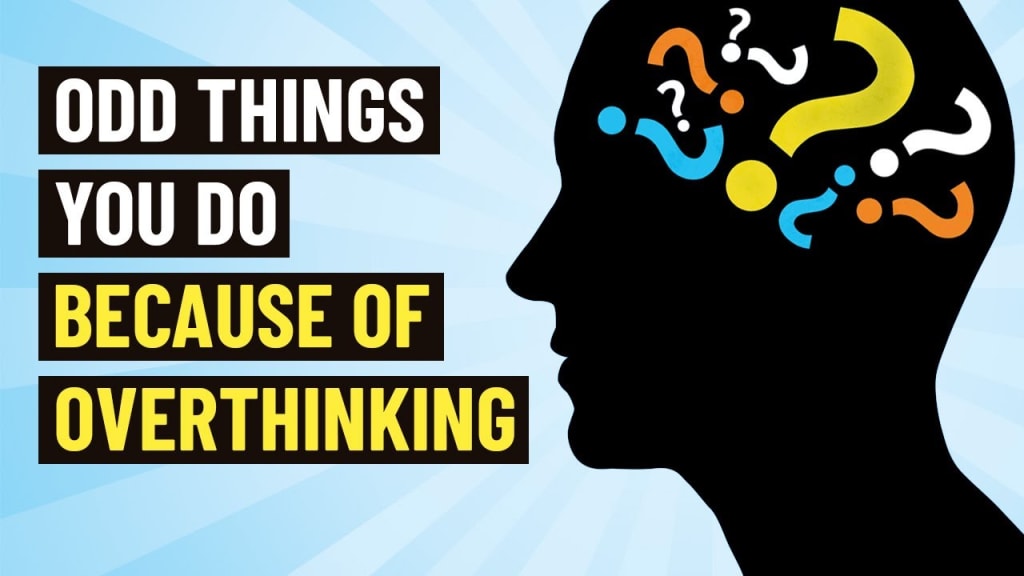10 Odd Things Overthinking Makes You Do
It’s safe to say that everybody overthinks sometimes. Whether it’s worrying about improbable catastrophes or mulling over hypotheticals, we all spend time thinking about things that probably shouldn’t occupy our minds. But dwelling on things excessively and overthinking everything can become problematic. This tendency is often tied to anxiety and depression, and you may not even realize you’re doing it! Nevertheless, overthinking can have a significant impact on how you engage with and experience the world around you. In this video, we explore the effects of this common behavior and how it can get the better of you.

10 Odd Things Overthinking Makes You Do
It’s safe to say that everybody overthinks sometimes. Whether it’s worrying about improbable catastrophes or mulling over hypotheticals, we all spend time thinking about things that probably shouldn’t occupy our minds. But dwelling on things excessively and overthinking everything can become problematic. This tendency is often tied to anxiety and depression, and you may not even realize you’re doing it! Nevertheless, overthinking can have a significant impact on how you engage with and experience the world around you. In this video, we explore the effects of this common behavior and how it can get the better of you.
Number 1 - Spacing Out Overthinking can make you feel like you’re in a daze. It’s like your mind is on autopilot, and you’re not fully present in the moment. When you’re constantly analyzing and over-analyzing, you can easily become distracted and lose focus. You might find yourself spacing out in the middle of conversations or zoning out when you’re reading, working, or watching TV. Next thing you know, you’ve missed out on important details or lost track entirely.
Number 2 - Asking The Same Questions Repeatedly If you’re an overthinker, you likely find yourself asking the same question over and over, even though you already know the answer. That’s because overthinking can cause you to doubt and second-guess yourself, making you feel like the answer has somehow changed. And sometimes, this tendency comes across as interrogatory, since it can make others feel like you’re questioning them, rather than just asking questions in general.
Number 3 - Apologizing for No Reason Making mistakes is a natural part of being human. But when you’re prone to overthinking, it can cause you to blow things out of proportion, so they seem much bigger than they actually are. It makes you feel like you’re constantly walking on eggshells. You might find yourself apologizing for something that wasn’t even your fault, or worrying that others will notice your mistake and be upset about it.
Number 4 - Obsessively Googling Things You could be feeling sick, stressing about the weather, or planning a trip; whatever it is, when you’re in the throes of an overthinking episode, you might find yourself compulsively Googling things. And while it can seem like searching for answers online is harmless, it can prove otherwise. When you go looking for reassurance online, all too often what you get is more stress and confusion instead of clarity because there are so many different perspectives and opinions. It can be hard to draw conclusions. And then what happens? You start to overthink things even more!
Number 5 - Constantly Analyzing Social Interactions Overthinking can make you feel like you’re on the outside looking in. It’s not just that you’re analyzing your own behavior, but also the behavior of others. You examine every interaction, wondering if you said the right thing and if others were judging you. As a matter of fact, you might overthink social interactions so much, that it makes it harder for you to be sociable. You’re so worried about what other people think of you, that it becomes hard to do anything without getting anxious.
Number 6 - Overplanning When you overthink things, you can end up overplanning like crazy. You start imagining all sorts of scenarios in your head, and then you try to plan for all of them. Before you know it, you’ve got this super complicated plan that might be completely unnecessary. Or worse, you can’t seem to make up your mind, so you keep tweaking and adjusting. You might even find yourself making plans for situations that are highly unlikely or impossible. All that planning just ends up being a big waste of time and energy.
Number 7 - Seeking Meaning in Everything You Experience The act of overthinking can also cause you to read way too much into situations or events. You might spend hours analyzing a text message, or wondering what someone meant by a certain look they gave you. It can feel like you’re constantly searching for answers to questions that may not even exist. Essentially, you’re looking for patterns and meanings where there’s no need for them. You’re trying to make sense of things that don’t need to make sense, and it can lead you down rabbit holes where you might create problems out of nothing.
Number 8 - Reliving Embarrassing Moments in Your Mind Have you ever had an embarrassing moment that you just can’t seem to forget? Well, overthinking can make it even worse! When you overthink something, you focus on all the things that went wrong and all the things you wish you had done differently. This can cause you to feel embarrassed and ashamed, even long after the event has passed. It’s like you’re stuck on a hamster wheel of regret and self-consciousness.
Number 9 - Overexplaining When you have a tendency to overthink, it’s easy to assume that you’re not being clear enough or that the other person might misinterpret what you’re saying. This can cause you to go into too much detail or to repeat yourself multiple times. You feel like there’s more and more to say, even though the other person probably gets it by now. The problem is that this is not only annoying, but it can make people feel like the conversation isn’t going anywhere. Like there’s just no end in sight.
Number 10 - Avoiding Things Overthinking often leads to avoidance, and that can be a real buzzkill in both your personal and professional life. For instance, if you’re offered a new job opportunity, you might start to overthink it and wonder if you’re really qualified for it. You begin to doubt your abilities and question whether you should take the job at all. Similarly, if you’re invited to a party, you might start to overthink it and worry about whether you’ll know anyone there or if you’ll be able to make conversation.
You imagine all sorts of worst-case scenarios and end up doing nothing. At the end of the day, overthinking can make you feel stressed and anxious, and mess with your ability to focus on other things. That’s why it’s important to recognize when you’re engaging in this behavior and take steps to manage it before it spirals out of control. It takes some time and practice to break free from the cycle of overthinking; but with patience and persistence, you can learn to develop a more mindful and present approach to life. For some practical tips and strategies for overcoming overthinking and living a more fulfilling life, check out this video on how to stop worrying and start living. You’ll find the link in the description below. If you found this video helpful, give it a thumbs-up, and share it with your friends, so we can keep making them.






Comments
There are no comments for this story
Be the first to respond and start the conversation.